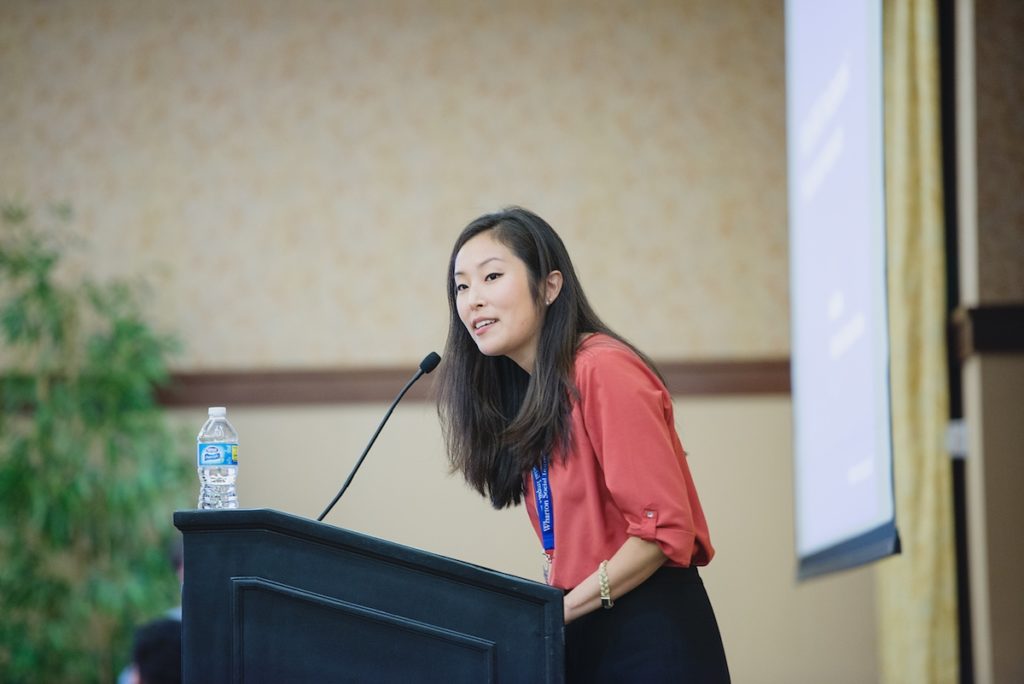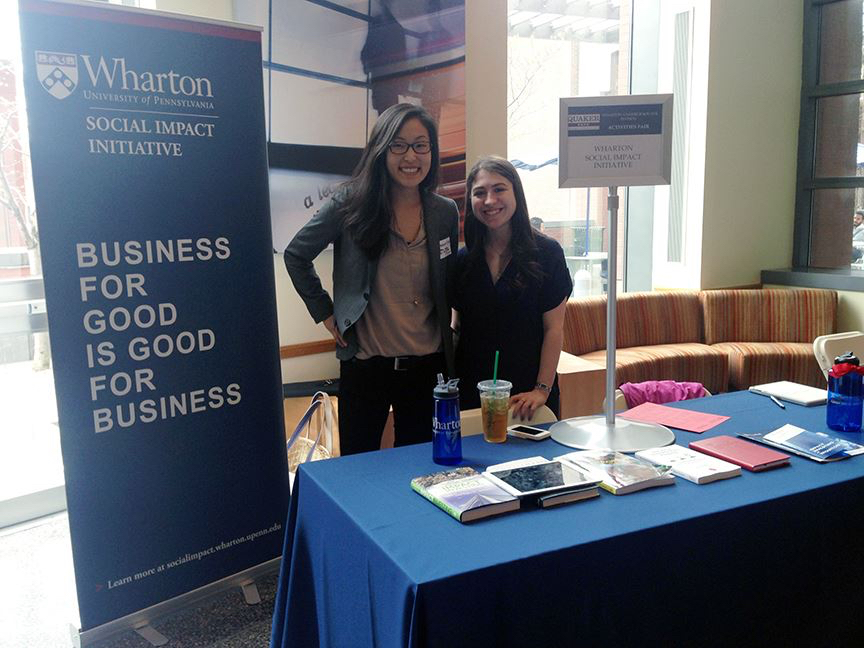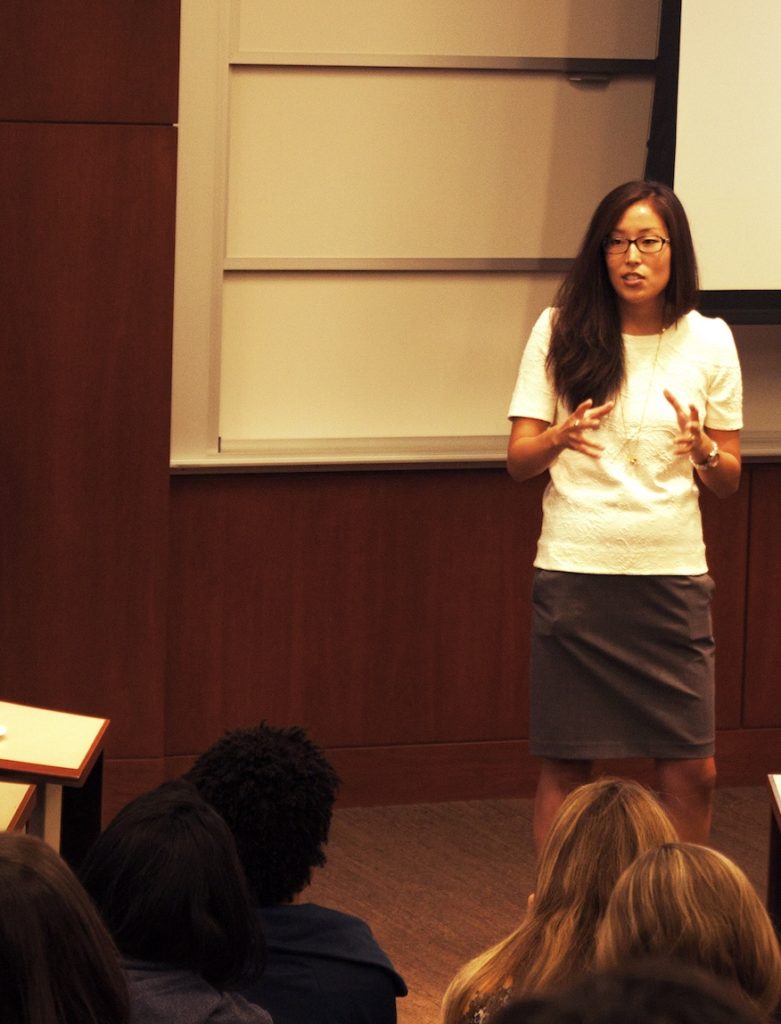Moving On: Wharton Social Impact Initiative’s Stephanie Kim
 August 17, 2016
Category: Featured, Long, People, Q&A
August 17, 2016
Category: Featured, Long, People, Q&A
Moving On is a series of Q&As with social impact leaders who are leaving their organizations for new opportunities. Here, they share what they learned and where they’re headed.
A lover of transportation metaphors, Stephanie Kim describes Wharton Social Impact Initiative as an airplane that’s just left take-off — a period of intense growth, firing on all cylinders — and entered a cruising altitude of figuring out just what it does best. Now, the associate director of community strategy is the one taking off.
Kim joined WSII three years ago after moving to Philadelphia with her husband, then a Wharton student.
“When I read the job description, I was like, ‘I was born to do this,'” she said emphatically while hugging a coffee mug. “It was the perfect thing where it was an extension of my professional background and a huge growth opportunity for me, plus a really sweet, cool opportunity to grow an organization that was clearly in startup mode.”
Eventually, Kim became a Penn student, too, and recently earned her master’s degree in public administration from Fels Institute of Government — on top of keeping a full-time job and co-teaching an urban studies course.
That’s basically five or six years of work squished into three, as she put it. Now, she’s leaving WSII — without a plan — to take a well-deserved break. In her Moving On interview with Generocity editor Julie Zeglen, she talks about the growth of WSII, where she’s seen her work be most impactful and the oft-neglected importance of self-care.
Generocity: For those who don’t know, can you explain what WSII does?
SK: It’s about training future business leaders to incorporate impact into what they do and to think about how they could leverage business strategies to create that impact. We’re applying it to Philadelphia and to sub-Saharan Africa, etc., but it’s bigger than any of the work that I do.
G: What does that work look like on the ground?
SK: It’s lot. [Laughs.] We do research, consulting, convening thought leaders and translating what we’re learning into industry. The thing that sticks out to me most — because maybe that’s what I value the most — is being a conduit and a translator between academia and industry. The way that I see it in my work in Philadelphia is, for instance, my work with the Urban Impact Scaling Lab, one of the things we did was we interviewed faculty to talk about how their research could possibly apply to Philadelphia. Many of them were never asked this question before. But this was something that [social impact leaders] within the city have told me — they would love to know a little bit more about Penn’s research can apply to what they’re doing.
Being housed within a university, another thing that I value very much is making sure that the students who pass through our walls come out with a better understanding of how what they’re learning in the classroom applies to the world. So, most of the projects that I’ve done, I’ve included students every step of the way. This past year, we had almost 200 students involved in our initiative in one way or another. Seventy of them were through our social impact fellowship, working with us. They’re creating financial models, they’re doing market analysis, they’re working on real, relevant projects that are important to us strategically.
This is what I think experiential learning could really be. We don’t want to teach students to just remain in their ivory tower and give blanket recommendations for how the world should run. We try to expose them to as many facets of the impact world as possible that aligns with our mission. Leadership and social impact involves so much more than being smart and knowing consulting frameworks — it’s about humility, it’s about compassion. Business schools have never been in that picture before, and we strongly believe that we could and should be.
G: We’ve talked about this so many times before, but, students wanting to get involved with social impact — there’s been a surge of it recently. And so, that informed the formation of WSII. How do you see the program growing?
SK: I joined maybe on year three of the organization, and I was employee number five. Very, very piecemeal growth before then, and then when I did join, there was this really accelerated growth. We’ve learned a lot about what we’re good at, what we’re not, what makes sense for us.
I don’t know where we’re going to end up. I do think our work in impact investing is the best that’s out there. I do think that our work in Philadelphia has to continue and will, given our presence here and how important it is to Penn in general. I do think that students will remain involved in one way or another.
G: What is some point of impact you can point to to translate all of this work? Or is this all just the groundwork?
SK: I do think most of our work was focused on creating the foundation these past few years, and it’s a question that we’ve been asking ourselves a lot lately — how are we talking about our impact? For me, the top things that come to mind are empowering and equipping the individual students that have worked with us. The reason why I say it’s still early-stage work is because while I do think impacting individual lives is important, we shouldn’t stop there.
I also think a lot about how, three years ago when I came here and we would go out and have meetings in the city, [social impact leaders] would tell us, ‘Honestly, we didn’t think Wharton cared,’ or ‘We didn’t think Penn would do this kind of thing. We thought West Philly was the focus.’ For us, we wanted to have this posture of learning, so I just went out and met with a lot of people.
Compare that to now, when WSII is a pretty common name now in Philadelphia. Building the foundation for our city and the university to work together — that’s something that I’m probably the most proud of.
G: And now, your future — are you staying in Philadelphia?
SK: For the time being, yes, while I figure out my life. [Laughs.]
G: What do you most want to talk about right now?
SK: I think a lot of people don’t talk about moves like this. It’s really scary and countercultural still to leave your job, especially when your job is awesome. When you’re so happy, when you work with such an incredible team and incredible boss, it’s kind of shocking to realize that this is the decision that’s right for you. And so, I was really excited to talk [to Generocity] about that because, I feel really good in that piece about what I’m doing, even though I have no idea what I’m doing, and I want people to know that it’s not like I’m leaving with a very clean and calm sense of what I want to do next. I want it to be known that at this stage in your career, it’s OK to not have it together.
The other thing that I wanted to share is that, once I told my boss six weeks ago, I wanted to make sure that this entire process of leaving the organization was as honorable and respectful to her and the organization as possible, and that people who look at the way that I’m leaving and say, ‘That’s consistent with how Stephanie works.’ I wanted to be proud of the way that I left.
I’ve also learned about myself that I’m obsessed with working. I love being busy, and I love building things to perfection. Times like last semester when I just worked myself into the ground — these past three years in Philadelphia, I’ve fit five years of work into it, maybe six. I haven’t let myself rest or take a break and I realized I don’t know how to do that, and when I force myself to take a break, I feel like I’m not doing a good enough job taking a break. And so, those were all signs to me that I needed to work on myself.
I think this next year is going to be getting a lot of randomness out of my system, trying new things, and I think a lot of it is going to be kind of pointless when you look at it by itself. But in the grand scheme of things, it’ll help me better understand myself and find that person who’s supposed to be at the other end of this process. That’s what I’m shooting for, but I have no idea what she looks like.
G: Anything else you’d like to share?
SK: It’s been a huge privilege, it’s been a huge blessing, I would do it all over again. I think this is something that will continue to go really far, and to know that I’ve been a part of that in the early stages, I’m really proud of that.
Project
Moving OnTrending News












